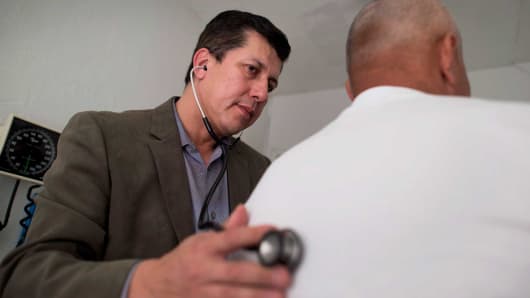The biggest business lesson of the last decade is that disruption can change an industry overnight – even collapse it. If you're not reading the signals to keep pace with evolving customer needs and new technologies, you won't come out on top. Even for those considered too big to fail. And that is exactly where the $400 billion U.S. life insurance industry is perched today, risking irrelevance. To survive, it's time to rethink the premise and promise of life insurance.
That's why John Hancock is transforming its 156-year old business model and will no longer sell traditional life insurance policies. Starting Wednesday, all of our policies will come with John Hancock Vitality – a platform designed to help policyholders live longer, healthier lives by giving people incentives to make healthier choices linked to physical activity, nutrition and mindfulness.
Our path here started with a simple, revolutionary thought: Your life insurance company should care how long and well you live.
All life insurance companies want their customers to live longer – it's basic economics. The longer a customer lives, the longer life insurance companies can invest customer premiums before delivering death benefits. But for too long, our industry wasn't truly investing in the very thing it is designed to protect: life.
And the time to act is now – lifestyle diseases are now the primary cause of death in America. Today just four choices — physical inactivity, an unhealthy diet, excessive alcohol and smoking — cause more than 60 percent of deaths and 80 percent of the disease burden in the United States, according to the Oxford Health Alliance.
These facts led to a fundamental question: How can we do business in a way that also creates value for society, and our customers, by addressing their needs and challenges? And how can we use technology to help make healthy choices easy choices?
We found the answer in 2015 with Vitality – an engaging, tech-enabled wellness platform that rewards customers for the everyday things they do to live longer, healthier lives. We began offering John Hancock Vitality as an option and quickly saw our relationship with our customers change dramatically.
Instead of asking, "Did you pass your cholesterol screening when you purchased life insurance several years ago?" we were able to understand if our customers were walking 10,000 steps, meditating more, and managing to sleep eight hours a night — and reduce their premiums as a reward for healthier behaviors. Just like car insurers can offer a safe-driving discount, we began understanding the power of rewarding healthy living.
Since we introduced John Hancock Vitality as an option three years ago, our policyholders have taken nearly twice as many steps as the average American, logged more than 3 million healthy activities like walking, swimming and biking, and engaged with us 576 times a year — compared to one or two times a year with traditional policies.
We started asking ourselves why all life insurance isn't sold this way Our industry is uniquely positioned to help reverse lifestyle-related illness and have a positive effect on the lives of Americans. It is the ultimate "Shared Value industry" — by embracing a business model that gives our customers incentives to live well, our customers live longer, healthier lives, we profit and society secures a healthier, more productive population and workforce.
We envision a day when life insurance is making positive, quantifiable contributions to addressing public health concerns. This will improve lives and business, but also serves a greater good. Because the lessons we learn can be shared with relevant government and NGOs to improve customer choices and advance public policy, further enriching the shared value cycle.
Like most disruptions, the obvious question is always why we didn't seen the obvious sooner. John Hancock is the only life insurance company fully embracing shared value in this way today, but the industry is structured in favor of it.
This isn't just the right thing to do for our business, it's the right thing to do for our customers and society.
We made this decision to only sell policies that help customers live longer, healthier lives because we believe business models can and must address social issues at profit, and I encourage others to follow suit.
Marianne Harrison is the president and chief executive officer of John Hancock, the U.S. division of Toronto-based Manulife Financial Corp.


